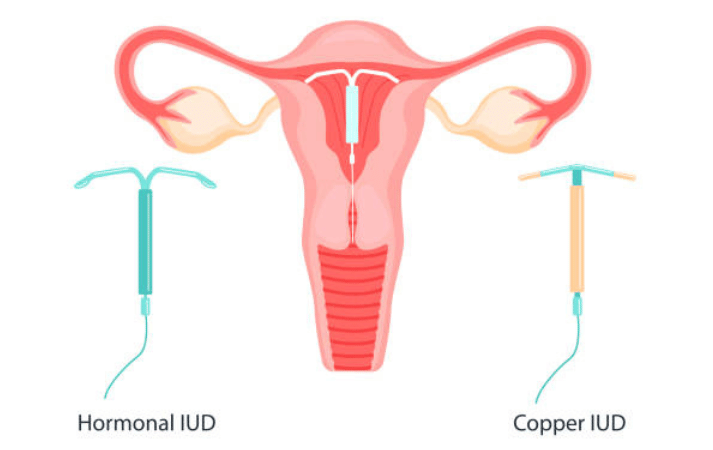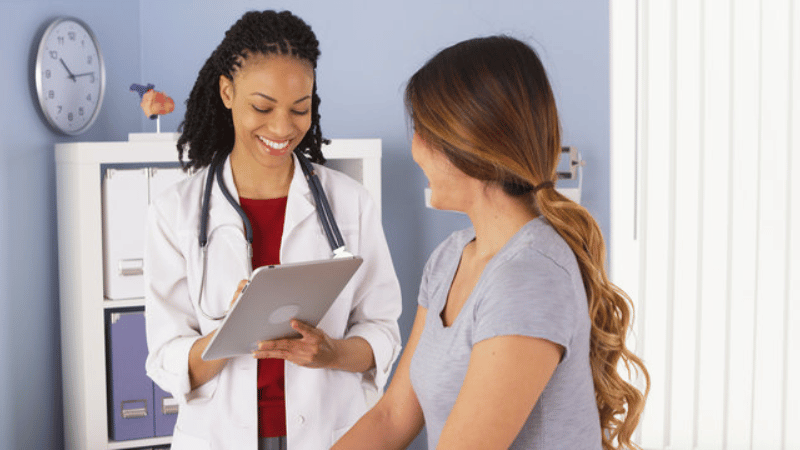
If you’re one of the millions of women living with uterine fibroids, you’re likely navigating a maze of treatment and birth control options. Intrauterine devices (IUDs) have emerged as a popular choice due to their long-term contraceptive benefits. But how do IUDs affect fibroids—do they provide relief or pose additional risks?
IUDs and Fibroids: Comprehensive Guide
In this comprehensive guide, we’ll explore how IUDs interact with fibroids, highlight the benefits and challenges, and provide insight into making an informed decision that suits your body and health needs.
Birth Control and Fibroids
When considering which method is your best birth control for fibroids, we recommend discussing the following topics with your doctor:
- Effectiveness: Although only abstinence is 100% effective at preventing pregnancy, several other methods, including an IUD, are 99% effective.
- Ease of use: Condoms can break, it’s easy to forget a daily pill, diaphragms are somewhat challenging to use, and you may dislike the idea of an implant. Think about what is most accessible and most comfortable for you. Once inserted, an IUD requires little attention and can be left in for 3 to 12 years.
- When you plan to have children: There are short-term, long-term, and permanent solutions when it comes to effective birth control. You may want to factor in the timing of your future family plans when choosing your method. An IUD is a long-term, though reversible, solution.
- Sexually Transmitted Disease (STD) risk: Although many types of contraception can prevent pregnancy, only one type can prevent STDs: condoms. If you are at risk for contracting an STD, we suggest using either external or internal condoms along with a backup birth control method for greater protection.
- Your period: If you are experiencing heavy periods and severe cramps due to uterine fibroids, hormonal birth control may help control your symptoms. Some IUDs, birth control pills, and several other contraceptive methods involve the use of hormones.
- Fibroid hormones: Because there is a link between fibroids and the hormones affecting the uterine lining, such as estrogen and progesterone, you may prefer to avoid hormonal based birth control entirely, especially if heavy bleeding and cramps aren’t your primary concern. You may also be advised to avoid estrogen if you are breastfeeding, smoke, or have a history of breast cancer, high blood pressure, or blood clots.
Understanding IUDs
An IUD (intrauterine device) is a tiny, T-shaped device placed into your uterus to prevent pregnancy. IUDs are one of the most effective, easiest to use birth control options available.
There are two main types of IUDs available:
-
Hormonal IUDs (e.g., Mirena, Liletta, Kyleena, Skyla): These release a small amount of progestin, which thickens cervical mucus and may suppress ovulation.
-
Non-Hormonal (Copper) IUDs (e.g., Paragard): These release copper ions, which are toxic to sperm, preventing fertilization without altering hormone levels.
You may be wondering, “Can I get an IUD if I have fibroids?” For many, the answer is yes. However, there are some cases when uterine fibroids distort the shape of the inner uterus. If this occurs, an alternate birth control method is more appropriate.
Can I Get an IUD If I Have Fibroids?
When You Can Get an IUD with Fibroids
-
If your fibroids are small or located outside the uterine cavity (subserosal), they usually won’t interfere with IUD placement.
-
Hormonal IUDs (like Mirena) are often recommended because they can reduce heavy menstrual bleeding, a common symptom of fibroids.
-
Many women with fibroids successfully use IUDs for both birth control and symptom relief
When an IUD Might Not Be Suitable
-
If fibroids are large or distort the uterine cavity (especially submucosal fibroids), they can make IUD insertion difficult or impossible.
-
Fibroids that alter the shape of the uterus may increase the risk of IUD expulsion (when the IUD comes out of the uterus).
-
In these cases, your doctor might suggest imaging (like ultrasound) before attempting insertion or recommend alternative treatments.
Interaction Between IUDs and Fibroids
Impact of Hormonal IUDs on Fibroids
-
Hormonal IUDs can reduce heavy menstrual bleeding, a common fibroid symptom.
-
They do not usually shrink fibroids, but many users report symptom relief.
-
In some cases, fibroids can distort the shape of the uterus, making placement of the IUD difficult or leading to a higher risk of displacement or expulsion.
Impact of Non-Hormonal IUDs on Fibroids
-
Copper IUDs do not influence hormones, so they won’t relieve fibroid-related symptoms like heavy bleeding.
-
In fact, they may worsen menstrual symptoms—causing heavier periods and more cramping.
How Fibroids Affect IUD Placement
-
Large or multiple fibroids can distort the uterine cavity, making insertion technically challenging.
-
There’s also a greater risk of IUD expulsion, which may reduce contraceptive effectiveness.
Clinical Studies and Research Findings
-
Hormonal IUDs: Clinical research has shown that IUDs like Mirena reduce menstrual blood loss by up to 90%, even in women with fibroids.
-
Non-Hormonal IUDs: Studies report mixed outcomes, with many users experiencing worsened symptoms.
-
Placement success is highest in women with small or subserosal fibroids (those on the outer wall of the uterus).
Talk to a Fibroid Specialist Now
What Our Experts Want You to Know About IUDs and Fibroids
When choosing either a hormonal or non-hormonal IUD, we want you to be aware that you may possess higher rates of IUD expulsion than a woman without fibroids. IUD expulsion is when an IUD falls out of the uterus, either fully or partially. If this occurs, you should use an alternate method of birth control and contact your doctor to see if you should attempt reinsertion.
If you are considering any type of IUD, we want to be very clear that fibroid symptom relief is not the same thing as fibroid treatment. In other words, an IUD will not prompt your fibroids to shrink, disappear, or stop growing.
When you decide to have your IUD removed in the future, your fibroid symptoms are likely to return. If you remove your IUD to become pregnant, you should know that pregnancy hormones often cause fibroids to grow. Fortunately, our fibroid experts have a solution.
Uterine Fibroid Treatment at USA Fibroid Centers
Although certain birth control methods, including hormonal IUDs, can give you temporary relief from fibroid symptoms, there is a better way to go. We suggest visiting one of our fibroid specialists to learn how to treat the underlying cause behind your symptoms.
If you’ve been avoiding treatment because you believe hysterectomy –– the complete surgical removal of the uterus –– is your only option, we have good news. At USA Fibroid Centers, we offer an effective, minimally-invasive fibroid treatment called Uterine Fibroid Embolization (UFE).
Uterine Fibroid Embolization can:
- Be performed as an outpatient procedure
- Eliminate your symptoms
- Retain your fertility
- Quickly get you back to normal living
UFE takes only 30 to 45 minutes, and you can return home after a short recovery period. To explore how UFE can help you find freedom from fibroids, schedule an appointment online. Oh, and don’t forget to put together a list of your fibroid-related questions! We look forward to answering all of them and helping you reclaim your life. You can also call 855.615.2555 to visit one of our accredited centers close to you.





